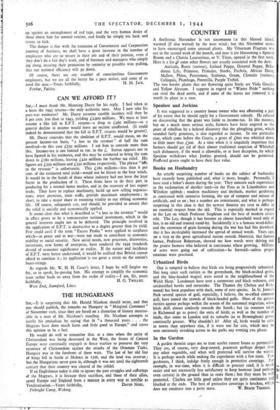CAN WE AFFORD IT ?
Sm,—I must thank Mr. Manning Dacey for his reply. I had taken as a basis the 1943 returns—the only authentic ones. May I now take his post-war estimates? Mr. Dacey assumes taxable incomes will then be 8 per cent. less than in 1943, yielding £2,900 millions. We must at least assume a like fall in E.P.T. returns—a drop to £460 millions—as a general decline in income would leave no section unaffected. (It could indeed be demonstrated that the fall in E.P.T. returns would be greater).
Mr. Dacey concedes that the abolition of E.P.T. would mean, on the present income-tax basis, " a loss to the revenue " of half the sum involved—in this case £230 millions. I ask him to concede more than this. Income-tax is not limited to los. in the £. Surtax appears not to have figured in his estimates, and this may be estimated to bring the sum down to £180 millions, leaving £420 millions for further tax relief. His figures are £250 millions and £350 millions respectively. The phrase " Idgs to the revenue " is unfortunate. This £180 millions—less than 6 per cent. of the estimated total yield—would not be blown to the four winds. It would be in the hands of those whose industry had not been the least factor in the production of it. These firms have to do their part in producing for a normal home market, and in the recovery of lost export trade. They have to replace machinery, build up new selling organisa- tions, erect premises, train staffs, provide maximum employment ; in short, to take a major share in restoring vitality to our ebbing economic life. Of course, safeguards can, and should, be provided to ensure that the relief is socially and economically applied.
It seems clear that what is described as " a loss to the revenue " would in effect prove to be a remunerative national investment, which in the general interests ought not to be deferred. The principle involved in the application of E.P.T. is destructive to a degree greater than its yield. Few could cavil if the term " Excess Profits " were applied to surpluses which—in peace and in war—were not made to contribute to economic stability or social security. New social needs, new processes, discoveries, inventions, new forms of enterprise, have rendered the 1939 standards devoid of economic significance or reality. If the nature and incidence of E.P.T. were better understood, it would be realised that Britain cannot afford to continue it ; its application is too great a strain on the nation's heart-strings.
As regards Mr. W. H. H. Court's letter, I hope he will forgive me for, so to speak, by-passing him. His attempt to simplify the economic issue rather leads us away from the realm of reality.—I am, Sir, yours


























 Previous page
Previous page